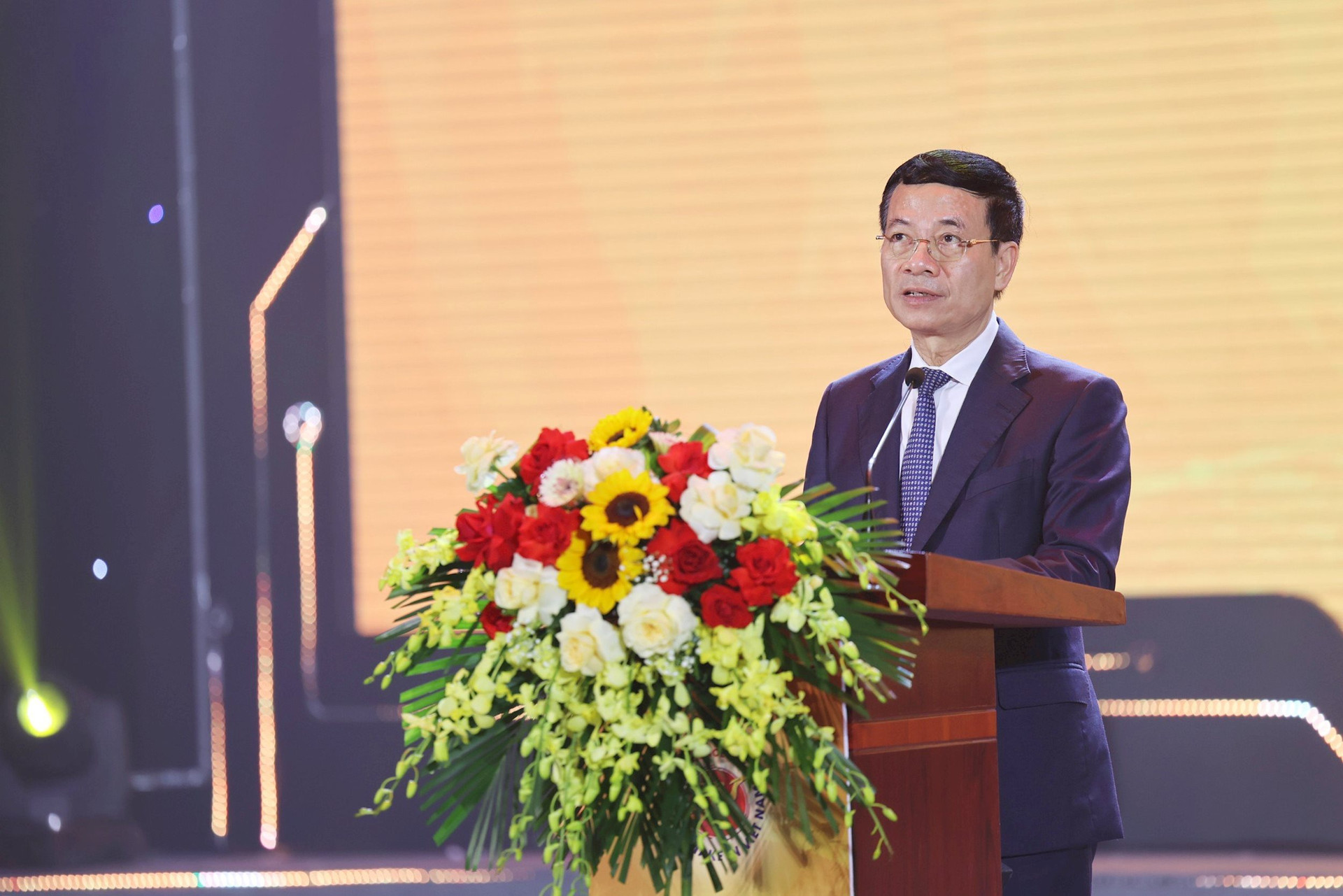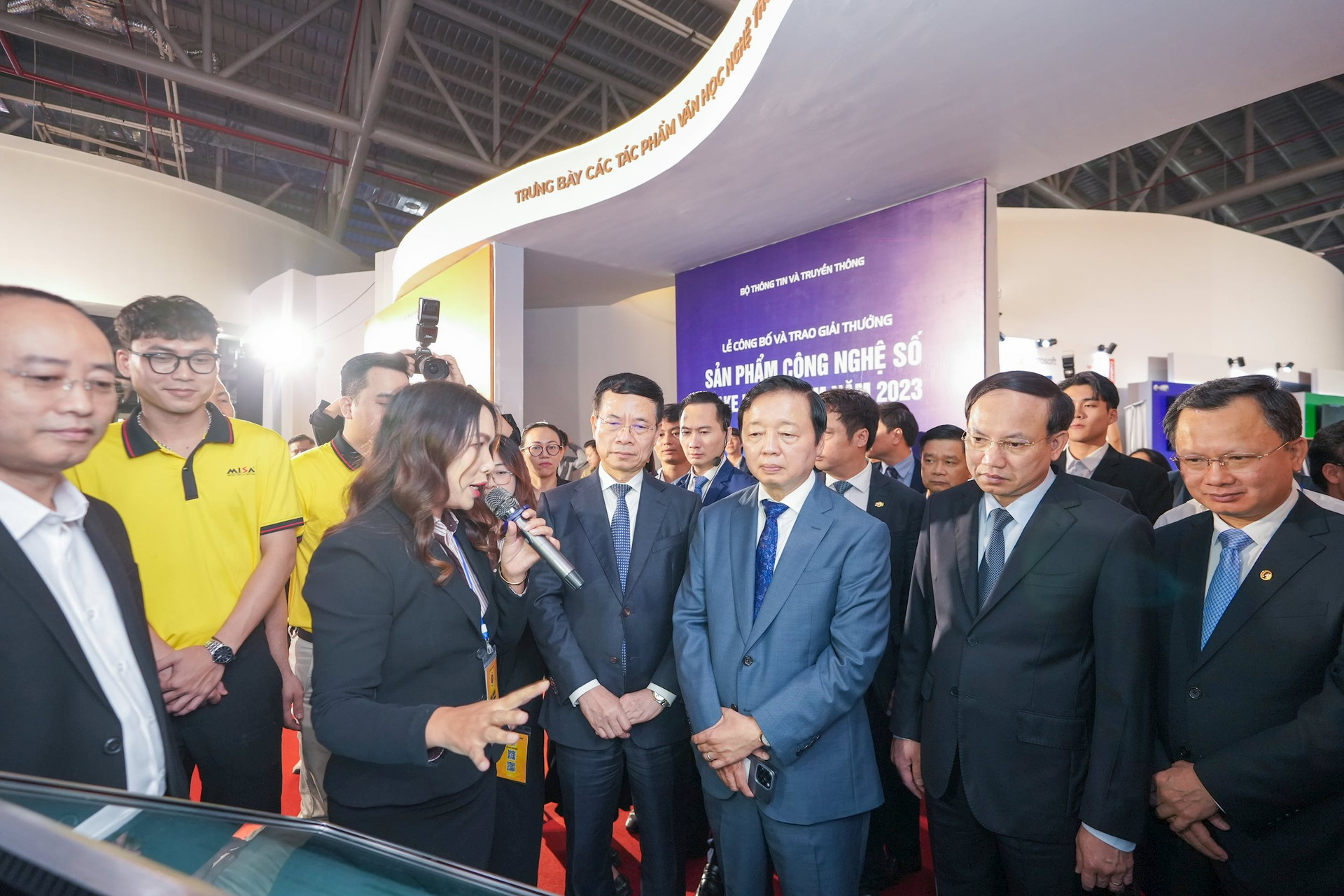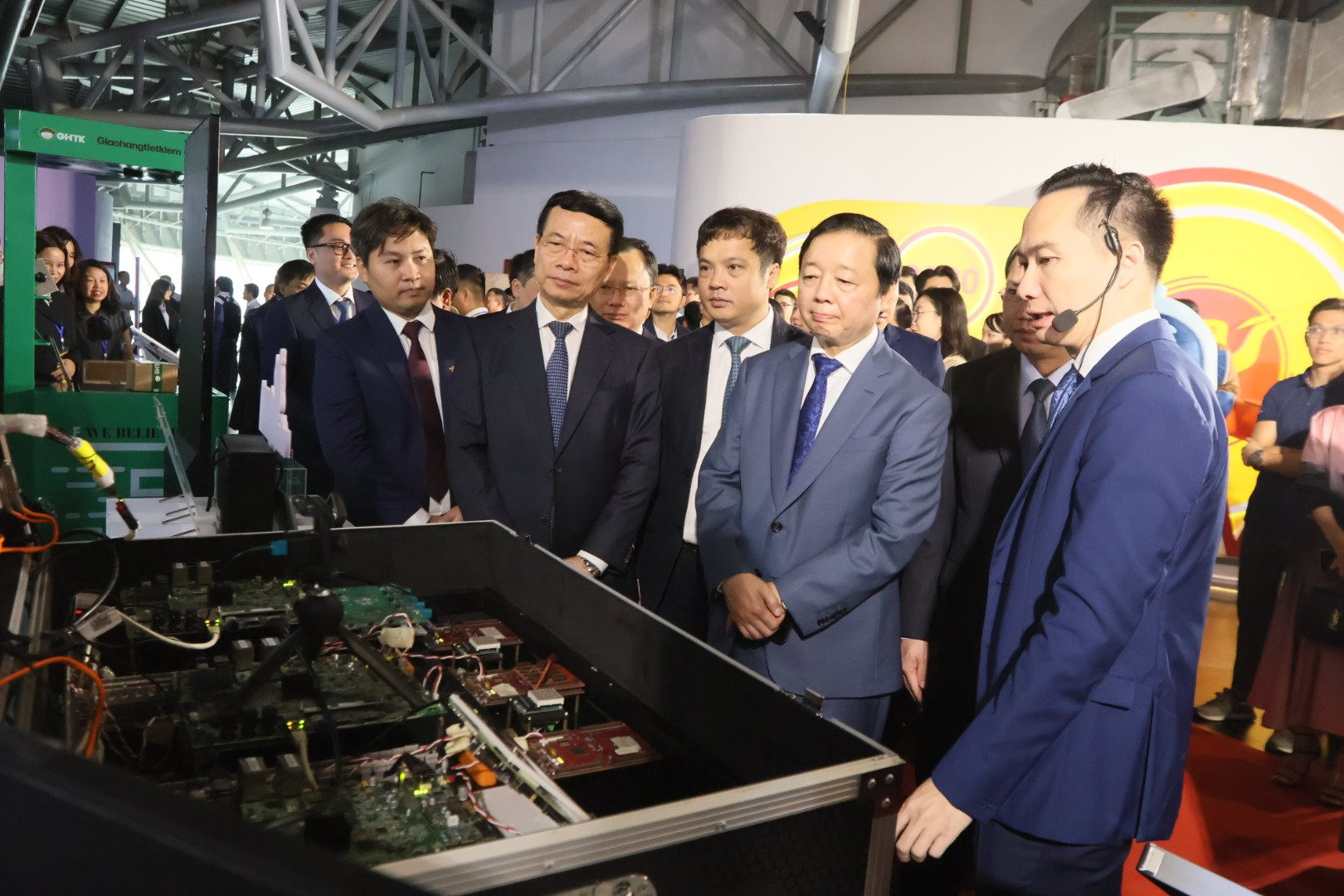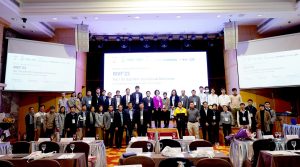Minister of Information and Communications Nguyen Manh Hung emphasized: The theme of the National Forum for the Development of Digital Technology Enterprises in 2023, and also the theme for 2024, is: Innovating digital applications for the development of the digital economy – a new driving force for economic growth and labor productivity.
On December 11, 2023, in Ha Long City, Quang Ninh Province, the Ministry of Information and Communications, in coordination with the People’s Committee of Quang Ninh Province, organized the National Forum for the Development of Digital Technology Enterprises in Vietnam – Make in Vietnam 2023 for the fifth time, under the theme “Innovating digital applications for the development of the digital economy – A new driving force for economic growth and labor productivity.”
The magazine “Information and Communications” is pleased to present the full speech of Minister Nguyen Manh Hung at the ceremony.

Minister Nguyen Manh Hung: Looking back at the past 4 years, from 2019 until now, the Vietnamese digital technology industry has taken encouraging steps in development and maturity.
The National Forum on the Development of Digital Technology Enterprises in Vietnam is held every December. December is also the occasion to celebrate a special day for the digital technology community, the Digital Technology Enterprises Day of Vietnam on December 12.
Vietnam, up to this moment, is perhaps the only country in the world with a day dedicated to honoring digital technology enterprises. Tomorrow is December 12. Congratulations to entrepreneurs and Digital Technology Enterprises of Vietnam!
The forum is a time for us to review, summarize, and evaluate the development, honoring outstanding digital technology enterprises through the Make in Vietnam Digital Technology Product Awards.
These are outstanding digital technology products designed, innovated, and produced in Vietnam, with a significant impact on shaping the digital environment for citizens, businesses, and government, contributing to promoting the development of the Digital Government, Digital Economy, and Digital Society.
Looking back at the past 4 years, from 2019 to now, the Vietnamese Digital Technology Industry has taken encouraging steps in development and maturity.
The number of digital technology enterprises has increased by 30%, digital technology industry revenue has increased by 32%, and the proportion of Make in Vietnam in digital technology products has increased from 21% to 29%. In the field of software production for foreign countries alone, there is a 43% increase, and we now have over 1,400 enterprises in this category, with revenue gradually approaching the $10 billion mark.
In 2019, we named and gave birth to the Digital Technology Community of Vietnam, with the mission of Make in Vietnam: Research in Vietnam, Innovate in Vietnam, Produce in Vietnam, contributing to helping Vietnam escape the middle-income trap, realizing the aspiration of a strong and prosperous Vietnam. Vietnam not only assembles and processes but also innovates Vietnam’s products, solves Vietnam’s problems, and goes global.
To go far, remember the initial mission!
Innovating digital applications for digital economic development (KTS) – a new driving force for economic growth and labor productivity.
The theme of this year’s forum and also the theme for 2024 is: Innovative digital applications for digital economic development – a new driving force for economic growth and labor productivity.
Innovating digital applications for digital economic development (KTS) – a new driving force for economic growth and labor productivity.
Minister of Information and Communications Nguyen Manh Hung.
The most important thing for KTS development is digital applications, digital transformation (CĐS) applications for industries. So who will do this? It must be the telecommunications companies, the digital technology enterprises. We have the infrastructure, we have the technology, we have the workforce, we have the understanding of digital transformation, so we must be the ones to create digital transformation applications for industries to sell to them. In recent years, we have left this task to the industries to do on their own, and therefore, digital transformation has been very slow.
Developing digital applications for industries is also about creating products, it is also about Make in Vietnam. Telecommunications companies, digital technology enterprises must consider this as a research and development activity.

China Mobile, a Chinese telecommunications company, allocates up to $4 billion annually for the development of applications and use cases across industries. They have successfully developed over 30,000 industrial 5G applications, leading to an annual revenue increase of over 10%. The 5G application market is projected to reach $670 billion by 2025, potentially boosting network revenue by 50% compared to 2020.
Therefore, tens of thousands of digital technology enterprises in Vietnam should enter various industries and sectors to innovate digital applications, facilitating digital transformation and developing digital solutions for these industries. This is also the process of industrialization and modernization for the country. Vietnamese digital technology enterprises now have a new mission: industrialization and modernization of the country through creating digital applications and solutions for various industries and sectors.
The development of the digital economy in each sector is crucial for increasing the labor productivity of those sectors. Vietnam has been struggling for years to achieve the goal of labor productivity growth. The solution to this challenging issue lies in innovating digital applications to foster the digital transformation of various industries.
In 2024, there will be a nationwide commercialization and development of 5G to establish the infrastructure for industrial digital applications.
“In 2024, we will also focus on the development of AI, especially narrow AI, creating AI applications for specific sectors, and industrial AI.”
Minister of Information and Communications Nguyen Manh Hung
In 2024, the focus will be on developing AI, especially narrow AI, creating AI applications for specific sectors and industries. Narrow AI operates when humans provide it with a specific purpose and certain rules. Without these, AI will remain inactive. Humans can specify different purposes and rules in various contexts to address different problems. This does not include deciding what data to feed AI, what algorithms to use, and how to teach it. Therefore, human efforts will be concentrated on nurturing and guiding AI to achieve specific goals, directing it where it can assist us.
Eventually, each person will have a personal virtual assistant that not only possesses humanity’s knowledge but also reflects individual characteristics. Narrow AI and industrial AI applications will provide quick efficiency gains, enhancing labor productivity, making the workforce smarter, and posing fewer risks. Therefore, it is advisable to start quickly with narrow AI applications.
“2024 is also the first year we implement the national strategy for semiconductor industry development.”
Minister of Information and Communications Nguyen Manh Hung
In 2024, Vietnam will commence the national strategy for semiconductor industry development. The semiconductor industry is foundational and crucial to the country for the next 30-50 years. As long as human development relies on information and data as input factors for production, data processing, i.e., semiconductor chips, will remain crucial. The demand for data processing will be as essential as the demand for electricity and water. Some countries have introduced the concept of Computing Utility, signifying computational infrastructure.
Our fundamental advantage is that the Vietnamese people have a predisposition toward STEM (science, technology, engineering, and mathematics). STEM is fundamental to semiconductor technology and chip design. Of all advantages, genetic advantage is the most important, likely on par with political advantages. Labor advantages will lead to other advantages. Being a global center for semiconductor talent will result in becoming a global center for the semiconductor industry.
When developing the semiconductor industry, we should consider it in a larger context, a bigger picture. If we talk about the semiconductor chip design market, it is only $60 billion, and even the entire semiconductor industry is $600 billion. However, the electronics industry is over $3,000 billion, and the CDS industry is over $20,000 billion, which is more than 30 times the semiconductor industry.

Developing semiconductor technology is also an opportunity for Vietnam to revive its domestic electronics industry (such as consumer electronics, medical electronics, industrial electronics, etc.), especially as the industry is transitioning to AI and IoT-enabled devices. The semiconductor industry is also the core of the digital transformation industry (CĐS), which represents the largest market for semiconductor chips.
With a population of 100 million, Vietnam is a large market experiencing rapid development, industrialization, digital transformation, and high consumption of electronic products, making it favorable for the semiconductor industry.
The semiconductor industry is a global supply chain, a globally integrated ecosystem. Vietnam will develop its semiconductor industry within both domestic and global ecosystems, achieving autonomy while fostering international cooperation. However, Vietnam must move towards a complete supply chain, not just a few stages. Given the rapid pace of digital technology evolution, only a comprehensive national supply chain can keep up with the speed and maintain cost-effectiveness.
“Without Make in Vietnam, Vietnam cannot become a developed country. Without Make in Vietnam, we cannot go to the world. Without Make in Vietnam, Vietnam cannot be self-reliant. Without Make in Vietnam, Vietnam cannot be strong and prosperous.”
Minister of Information and Communications Nguyen Manh Hung
Vietnam, with its dense concentration of digital technology enterprises, aspires to create Vietnamese products and make a global impact with Vietnamese technology. The government, ministries, and local authorities are expected to assign significant tasks to these enterprises for national transformation, industrialization, and modernization. Only ambitious tasks and large-scale projects can give rise to significant Vietnamese enterprises.
Vietnamese digital technology enterprises are committed to exerting their full potential to transform Vietnam into a technological powerhouse, realizing the aspirations for strength and prosperity using technology, and not just that but also transforming Vietnam into a global digital technology hub. Vietnamese digital technology products will contribute to building the Vietnamese brand and contribute to the prosperity of humanity.


 Vi
Vi



